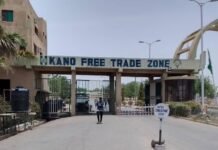The African Export-Import Bank (Afreximbank) last year disbursed a total of $18.7 to support trade, industrialisation, and business development across the African continent, the bank’s Chief Group Economist, Dr. Yemi Kale, disclosed yesterday.
Kale confirmed the figure during the presentation of the 2025 Africa Trade Report at the ongoing 32nd Annual General Meeting (AGM) of the bank in Abuja.
He described Afreximbank’s interventions as central to shaping the continent’s trade and economic structure, noting that the bank’s funding activities are designed to engineer transformation and strengthen the foundations of African enterprise and intra-continental commerce.
Meanwhile, Nigeria has pledged her commitment to collaborate with the bank as the continent seeks to build resilient institutions and deepen regional integration.
Vice President Kashim Shettima, represented by Dr. Tope Fasua, Special Adviser to the President on Economic Affairs, said the country is prepared to lead and work with partners to advance Africa’s development priorities.
He noted that Africa must move from mere resilience to a phase of renewal, requiring increased mobilization of blended finance to attract private capital for infrastructure and green energy investments.
Also speaking on the occasion, Central Bank of Nigeria (CBN) Governor Olayemi Cardoso, noted Afreximbank’s timely interventions during critical moments, including its counter-cyclical trade finance facility and contributions to Africa’s public health response.
He warned of growing challenges such as global protectionism, economic fragmentation, and geopolitical tensions that are increasingly affecting Africa’s development.
According to the 2025 Trade Report, Africa’s economy has demonstrated resilience in the face of persistent global economic uncertainty, and the continent’s future competitiveness depends heavily on a renewed focus on intra-African trade, especially through the African Continental Free Trade Area (AfCFTA).
The report identified three core financial pillars needed to unlock AfCFTA’s full potential and convert it into meaningful economic outcomes such as job creation and industrial upgrading. These are scaling African-owned development banks and sovereign-backed investment funds; establishing interoperable, low-cost cross-border payment and settlement systems; and projecting a unified African voice underpinned by robust data in global financial and regulatory fora.
With these pillars in place, the report suggested that Africa could turn global volatility into a springboard for inclusive and sustained growth.
![]()










